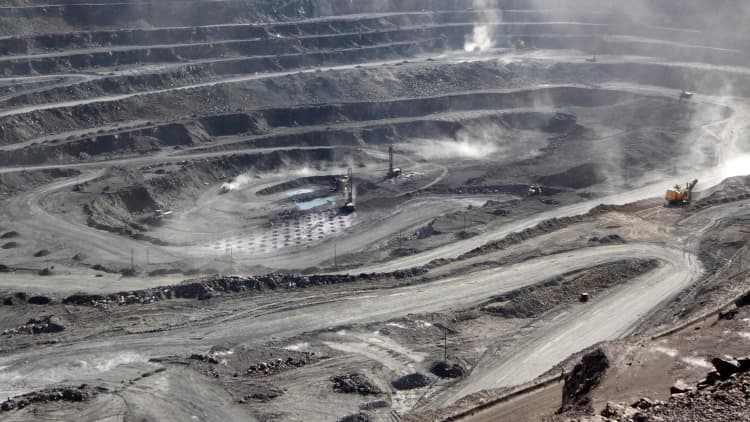
Pictured here is a rock containing tungsten ore at a mine in Germany operated by Saxony Minerals and Exploration.
Picture Alliance | Picture Alliance | Getty Images
BEIJING – China dominates the supply chain for many of the world’s most important minerals, but has so far held off on broad restrictions on at least one of them: tungsten.
The metal is almost as hard as diamond and has a high energy density. This has made tungsten an important material in weapons, cars, electric car batteries, semiconductors and industrial cutting machines. Chip manufacturers like Taiwan Semiconductor Manufacturing Company And Nvidia both use the metal.
“I don’t expect any saber rattling over tungsten,” said Lewis Black, CEO of Canada-based Almonty Industries, which is spending at least $75 million to reopen a tungsten mine in South Korea later this year.
“If you get too aggressive about diversification, [it becomes a situation that’s] “I bite the hand that feeds you,” he said, adding: “Tungsten has always been a diplomatic metal.”
While the Biden administration increased tariffs on tungsten imports in May, China last weekend did not include the metal in new regulations to strengthen its oversight of domestic rare earth production.
But China may not be too worried because the Chinese government has ignored the new tariffs… They have completely ignored it because the Chinese don’t want tensions to rise.
Lewis Black
CEO of Almonty
“The tariffs were more of a warning shot, as Biden only imposed tariffs on three of the 25 strategic metals China exports,” Black said.
“But China may not be too worried because the Chinese government has ignored the new tariffs, unlike in the past when it restricted some rare earth exports. They ignored it completely because the Chinese don’t want tensions to rise.”
Asked last month whether China would retaliate against recent U.S. tariffs on tungsten, Chinese Commerce Ministry spokesman He Yadong did not reveal any retaliatory measures. Instead, he called on the US to abolish the additional tariffs.
Commodity price reporting and analysis firm Fastmarkets pointed out earlier this year that China has reduced national production quotas for its tungsten mines due to environmental regulations.
Diversify away from China
Still, Black expects his company to benefit from increasing diversification efforts away from China. Almonty claims the upcoming mine in South Korea has the potential to produce 50% of the world’s tungsten supply outside of China.
Demand for non-Chinese tungsten is already increasing.
“We see that in the U.S. and Europe they are demanding a China-free supply chain from their suppliers,” said Michael Dornhofer, founder of metals consulting firm Independent Supply Business Partner.
The US REEShore Act – or Restoring Essential Energy and Security Holdings Onshore for Rare Earths Act of 2022 – bans the use of Chinese tungsten in military equipment from 2026, while the European Commission last year extended tariffs on imported Chinese tungsten carbide by another five years extended, Almonty Industries emphasized in a report.
The House Special Committee on Strategic Competition between the United States and the Chinese Communist Party last month announced the creation of a new working group on U.S. policy on critical minerals.
Rising tungsten prices
Expectations of higher demand and limited supplies of tungsten have pushed prices to multi-year highs, although they have eased in recent weeks.
Dornhofer said in an interview in late May that he was also seeing Chinese buyers increasing their tungsten purchases.
“Since the beginning of this year, they have not only been asking for Western concentrate, but also buying significant quantities and paying for it even more than Western companies are willing to pay,” he said. “Definitely [going to be] a game changer.
Back in January, US-based research firm Macro Ops said: “We are approaching an inflection point in tungsten supply. The U.S. will quickly run out of tungsten supplies and transition from being a net seller to a buyer in the next 12 to 18 months.”
The U.S. Office of Industry and Security at the Commerce Department did not immediately respond to a CNBC request for comment for this story.
Brandon Beylo, head of investment research at Macro Ops, told CNBC in an email that there are only six companies in the U.S. that have the capacity to produce tungsten. He added that the U.S. has not produced tungsten domestically since 2015, meaning future U.S. supplies will have to come from overseas.
He said the company does not own any shares related to tungsten, but that he is personally looking for ways to get access to the physical commodity. There are no futures for trading tungsten.
Other tungsten players go to South Korea
China dominates over 80% of the tungsten supply chain, according to Argus, although local production costs are rising as mines age, pointing to Chinese imports of the metal from North Korea, Central Africa and Myanmar.
“This represents an opportunity for projects outside of China,” Mark Seddon, head of consulting and analytics at Argus, said in a June 28 webinar.
Other non-Chinese companies in the tungsten supply chain are heading to South Korea.
According to a local news report, IMC Endmill, a subsidiary of Warren Buffett-owned IMC Group, signed an agreement with the Daegu city government in February to invest 130 billion Korean won (US$93.6 million) in a tungsten powder production plant.
IMC Group did not immediately respond to CNBC’s request for comment.

China’s dominance in global supply chains for critical minerals was built over several decades.
Dornhofer noted that efforts to produce tungsten outside of China have been stagnant for years, including plans for a mine in New Brunswick, Canada, that would have significantly increased global tungsten capacity.
All of these projects have been on the table for 20 years, he said. “When people tell you they’ll be up and running in two or three years, it’s a question of whether you believe them. On the other hand.” [hand], the tungsten is in the ground. It’s still there.”
Almonty claims to be the largest tungsten producer outside of China and currently operates primarily in Portugal and Spain. The future mine in Sangdong, South Korea, closed in the 1990s.
After the mine reopens later this year, Black expects his company will account for just 7% or 8% of the world’s tungsten supply.
“We are not displacing Chinese people,” he said. “We don’t plan to do that.”
“If we want to produce 30 to 40% now, I will start a fight with China, which would not be a wise decision.”
Source link
2024-07-03 01:15:03
www.cnbc.com














